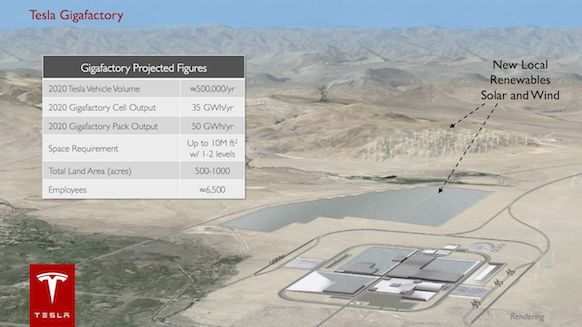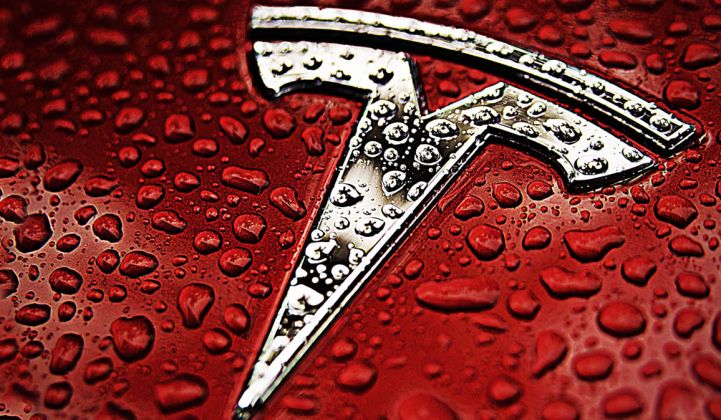The contest for Tesla's $5 billion Giga battery factory still includes California -- as long as the Golden State's lawmakers are willing to overlook long-established environmental regulations. Lawmakers in a number of states are looking to lure the manufacturing hub with its potential to provide more than 6,500 jobs. Sites in California that have been floated include an area near the Salton Sea and in the state capital, Sacramento.
In March, we covered the deep politics surrounding the site selection process for the Tesla Giga factory, which has pitted states against one another for the rights to the $5 billion high-tech manufacturing site. Tesla aims to build 500,000 electric vehicles per year by 2020 and will need an unprecedented volume of lithium-ion batteries to hit this target -- and that's why Tesla must build the Giga factory.
Tesla CTO JB Straubel has spoken of attacking battery cost with the Giga factory by "doubling the worldwide capacity in a single factory and reinventing the supply chain." A total of 35 gigawatt-hours of cell production from the new plant will be devoted to meeting the needs of the company's Fremont automotive plant, and 15 gigawatt-hours will be devoted to stationary battery packs.
Tesla intends on breaking ground on two sites and beginning the construction process at multiple sites to avoid delays.
We recently revealed one of the proposed sites as a location near Reno, Nevada and provided photographs courtesy of our Nevada source on the ground. The site is located at the Reno Tahoe Industrial Center at 2641 Portofino Drive.
In June, California made an aggressive move to throw its hat in the ring, putting forth new legislation looking to remove the regulatory and permitting roadblocks to constructing this enormous project. California Senate Bill SB-1309 was introduced by Senate President Pro Tempore Darrell Steinberg, a Democrat, and Senator Ted Gaines, a Republican. Some of the relevant language is excerpted below:
- This bill would state the intent of the Legislature to enact legislation to expedite groundbreaking and construction in California of a large-scale battery factory to manufacture batteries for both electric-vehicle and stationary uses. This bill would declare that it is to take effect immediately as an urgency statute.
- It is the intent of the Legislature to enact legislation, including, but not limited to, financial incentives and changes to regulatory and environmental processes, to expedite groundbreaking and construction in California of a large-scale battery factory to manufacture batteries for both electric-vehicle and stationary uses thus increasing the production of electric vehicles and renewable energy consistent with California’s efforts to fight climate change as well as creating economic opportunity and thousands of jobs in California.
Allen Young of Silicon Valley Business Journal notes that "the legislation does not call out by name the California Environmental Quality Act (CEQA), but some modification to the controversial law can be easily inferred," according to a Capitol staffer.
Today, the Los Angeles Times reported that the state is considering an incentive package that would exempt Tesla Motors from the 50-year-old environmental law, according to Sen. Gaines, who suggested "granting the automaker waivers for significant portions of the nearly half-century-old California Environmental Quality Act," as reported in the article. Like most states in the running, the California campaign also includes a massive tax break worth up to $500 million, according to reports.
CEQA, signed into law by Ronald Reagan during his environmentalist phase, is "California's broadest environmental law" according to the state government site, which defines CEQA's purpose as:
- Disclosing to the public the environmental impact of a proposed discretionary project, through the preparation of an Initial Study, Negative Declaration, or Environmental Impact Report
- Preventing or minimizing damage to the environment through development of project alternatives, mitigation measures, and mitigation monitoring.
- Disclosing to the public the agency decision-making process utilized to approve discretionary projects through findings and statements of overriding consideration.
- Enhancing public participation in the environmental review process through scoping meetings, public notice, public review, hearings, and the judicial process.
Among the incentives proposed for Tesla have been the ability to limit prior environmental review of plans for the California battery plant site.
The article quotes David Pettit, an environmental lawyer for the Natural Resources Defense Council, as saying, "I think it's a terrible idea. For one thing, it does indicate that we have two systems of law in California -- one for the super rich, and one for the developer doing multifamily housing.” The newspaper quoted Kathryn Phillips, director of the Sierra Club in California, as saying that waiving CEQA provisions is “unacceptable.”
Tesla Motors moves quickly as a corporation. We'll soon learn if California's efforts to lure the Giga factory by sacrificing its environmental policy will pay off.
Giga Factory Facts and Figures
-
Tesla announced a $1.6 billion convertible debt offering. Tesla looks to offer $800 million of convertible senior notes due in 2019 and $800 million due in 2021 to build the world's largest battery factory.
-
Elon Musk predicts that the new factory will produce batteries for 500,000 vehicles by 2020.
-
Tesla expects to send the kilowatt-hour price of batteries down by 30 percent.
-
The plan is for construction to start in 2014, with production beginning in 2017.
-
The facility will hold more than 6,500 workers in 10 million square feet of factory space.
-
The plant will provide recycling capability for old battery packs.
Here's a rendering of the proposed plant:




